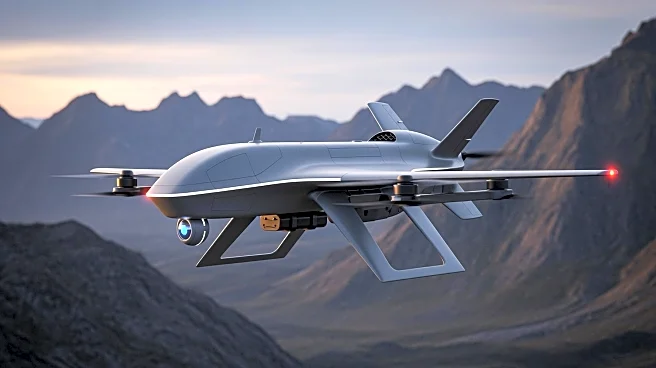What's Happening?
The conflict in Ukraine has significantly transformed modern warfare, with both Ukraine and Russia developing advanced drone and robot technologies. These innovations have altered traditional military strategies, as illustrated by recent reports from
the front lines. Ukraine's use of relatively inexpensive 'kamikaze' drones has proven effective in targeting fortified troop positions and supply lines, while 'FPV' operators can eliminate armored columns from a distance. The advent of ultra-thin fiber optic cables has further enhanced drone capabilities, allowing them to operate without interference from jamming systems. Ground drones, small tracked vehicles, have also been deployed, capable of advancing undetected and contributing to the capture of enemy soldiers.
Why It's Important?
The advancements in drone technology by Ukraine and Russia represent a significant shift in military tactics, emphasizing the role of unmanned systems in modern warfare. This development could influence global military strategies, as nations may prioritize investing in drone technology over traditional weaponry. The effectiveness of these drones in combat scenarios underscores the need for enhanced missile defense systems and counter-drone measures. The psychological impact on soldiers facing these technologies is profound, potentially altering the dynamics of ground warfare. As Ukraine continues to innovate, it may gain strategic advantages, influencing the broader geopolitical landscape and military alliances.
What's Next?
As drone technology continues to evolve, military strategies worldwide may adapt to incorporate these systems more extensively. Nations could increase investments in drone research and development, seeking to enhance their capabilities and countermeasures. The ongoing conflict in Ukraine may serve as a testing ground for new technologies, influencing future military engagements. Additionally, international discussions on the ethical and legal implications of drone warfare may intensify, as the use of autonomous systems raises concerns about accountability and civilian safety.
Beyond the Headlines
The use of drones in warfare raises ethical questions about the automation of combat and the potential for reduced human oversight. The psychological effects on soldiers and civilians exposed to drone attacks could have long-term implications for mental health and societal stability. Furthermore, the proliferation of drone technology may lead to increased surveillance capabilities, impacting privacy rights and civil liberties. As nations grapple with these challenges, the balance between technological advancement and ethical considerations will be crucial.















